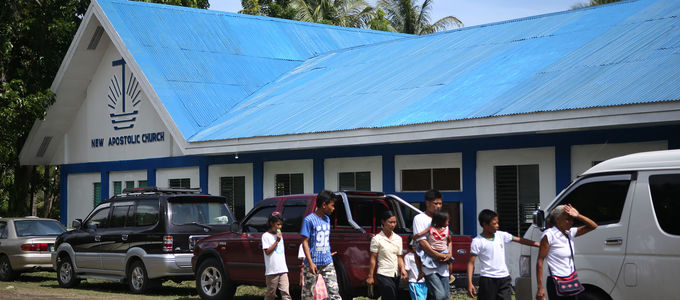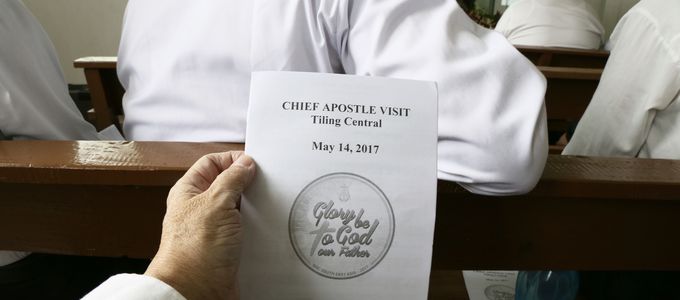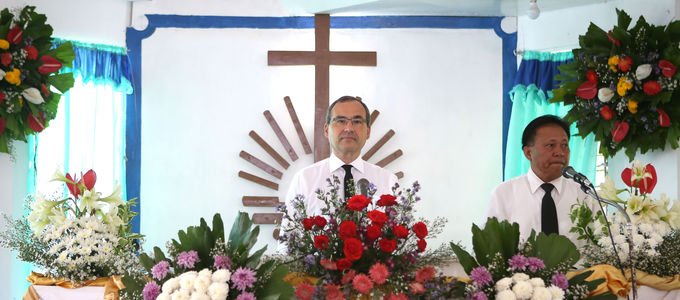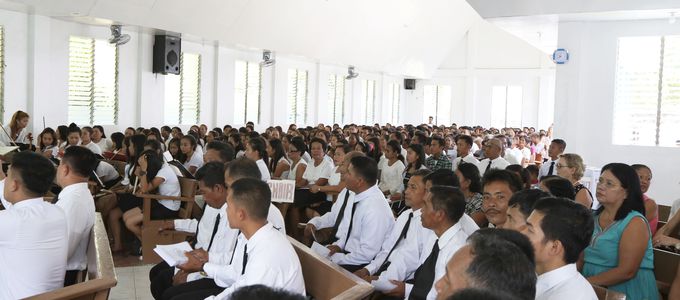
Divine services involve more than merely hearing the word of God, celebrating Holy Communion, and enjoying fellowship. There is something else: the communal prayer of the congregation. And this is really powerful stuff. Seven reasons why we should fold our hands together.
The first Christians continued steadfastly in the Apostles’ doctrine and fellowship, in the breaking of bread, and in prayers. Chief Apostle Jean-Luc Schneider picked up on only one aspect during his divine service in Tilling (Philippines) on 14 May 2017: “These all continued with one accord in prayer and supplication.” This was the key sentence of the long Bible passage he based his sermon on (Acts 1: 13–14). .
The prayer of the congregation – the framework
“That does not mean that they prayed day and night,” the Chief Apostle said. But the congregation gathered to pray as often as possible in the upper room of a house. Here it was quiet and they could pray undisturbed. “More than ever we live in a very noisy world. We need time to prepare ourselves for the divine service. Not only to be less tense, but also to put our thoughts in order so that the important things take priority.”
“The prayer of the congregation is teamwork,” the Chief Apostle said. Of course the prayer is spoken by the officiant at the altar, the Chief Apostle said, but he continued, “It is not his prayer. It is the prayer of the congregation.” He appealed to the ministers, “Please don’t preach when you pray! You don’t need to teach the congregation when you pray. The idea is to speak for the congregation so that everyone in the congregation can join in and feels included in the prayer.”
The prayer of the congregation – the content
What is the content of this common prayer? Chief Apostle Schneider found answers in the Bible—taken from events that took place in an upper room.
- Despite all risks Daniel continued to praise and worship God (Daniel 6: 11): “The mission of the church of Christ is to bring worship and praise to our God. Let us tell the world that we believe in God, that we have reason to thank Him.”
- The prophet Elijah asked God to save the son of the widow of Zarephath and grant him grace (1 Kings 17: 20–21): “Another wonderful task of the congregation is to come together and pray for our own salvation, but also for the salvation of all of mankind.”
- His successor, Elisha, interceded for the son of the Shunnamite woman (2 Kings 4: 33): “Another reason why we come together is to pray for all those who are suffering. It is not our mission to pray for them and force God to heal them. It is our wish, however, that our brother and our sister are saved, and that is why we pray for them, ‘Grant them the strength and the comfort they need to remain faithful.’”
- The pre-Pentecostal congregation prayed for the fulfilment of the promise of the outpouring of the Holy Spirit (Acts 1: 8): “It is and remains our greatest wish: Father, send your beloved Son! Lord, come soon! This longing must be felt in our common prayers.”
- Later, the congregation asked for a new ministerial gift to replace Judas (Acts 1: 24–25). “The Church needs good servants. There are surely many reasons to criticise them because no one is perfect. It is important that we pray for the servants of God. They need God’s grace, sanctification from God, and divine strength.”
- When Peter and John were arrested and were forbidden to speak or teach in the name of Jesus the congregation prayed to God to grant them boldness to speak God’s word (Acts 4: 29). “Proclaiming the gospel is not only the mission of the Apostles. Let us pray to God together: ‘Give us the courage to speak Your word and announce Your gospel in the world.”
- When Jesus washed His disciples feet (John 13: 14), He was calling upon everyone to forgive one another. “We confess our sins in front of the whole congregation. Are we aware of this? We pray for forgiveness and forgive one another. Is this forgiveness visible after the service? Think about this.”
“Let us pray like this more and more,” the Chief Apostle appealed to the congregation. Then we will experience that God will answer our prayers.” The promise of Jesus in John 14: 14 still applies: “If you ask anything in My name, I will do it.”












